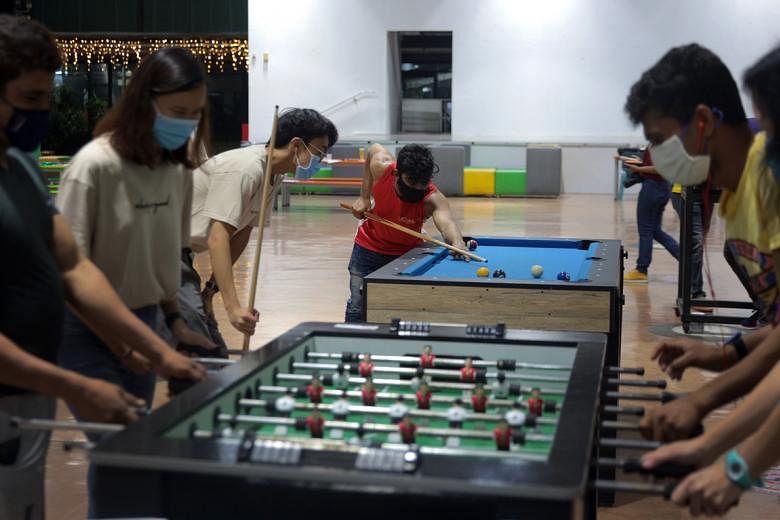SINGAPORE - Vaccinated migrant workers will not need to apply for exit passes to visit recreation centres from April 1, and the latest Covid-19 safety measures for the wider community will also apply to those living in dormitories.
These include increased group size limits from five to 10 people, and optional mask-wearing in outdoor settings effective from next Tuesday (March 29), as part of what Prime Minister Lee Hsien Loong called on Thursday a decisive step forward towards living with the coronavirus.
Migrant workers have had to apply for exit passes to selected locations in the community, before leaving their dormitories.
From April, only unvaccinated workers will need to apply for passes to visit recreation centres, and take antigen rapid tests (ART) beforehand, said the Ministry of Health (MOH) on Thursday.
Unvaccinated workers will still be not permitted to visit the community.
Last week, the number of vaccinated migrant workers allowed to make community visits was raised to 15,000 on weekdays and 30,000 on weekends and public holidays. The previous caps were 3,000 and 6,000 respectively.
These revised quotas will remain the same, said MOH on Thursday, but there will no longer be a need to do a pre-visit ART.
The alignment of safe management measures for migrant workers living in dormitories with those for the community started last week, with moves such as the resumption of sports activities for up to 30 fully vaccinated people also kicking in at supervised sports facilities within dormitories and recreation centres.
More than 98 per cent of migrant workers living in dormitories have been fully vaccinated, with the authorities noting a "very strong" take-up rate for booster shots.
The daily number of Covid-19 infections in dorms has mostly been fewer than 100 since December.
In February, Covid-19 testing measures for fully vaccinated workers were eased, with rostered routine testing no longer required for those living in dormitories and those in the construction, marine shipyard and process sectors.
Migrant workers' dormitories bore the brunt of Covid-19 infections in the first year of the pandemic, with case numbers there surging from 31 in April 2020 to 33,000 in June.
The workers made up 19 in 20 cases that year, and as at the end of 2021, more than 175,000 out of 323,000 dormitory residents had caught the disease.
They have largely been confined to their living quarters for the past two years, other than for work, essential errands or visits to recreation centres.
The Government also announced in September last year new standards to improve living conditions and reduce the risk of transmission of infectious diseases in dormitories, after the outbreaks of 2020 put a spotlight on cramped and unsanitary conditions within.
Read next: What you need to know about Singapore's latest Covid-19 rules


